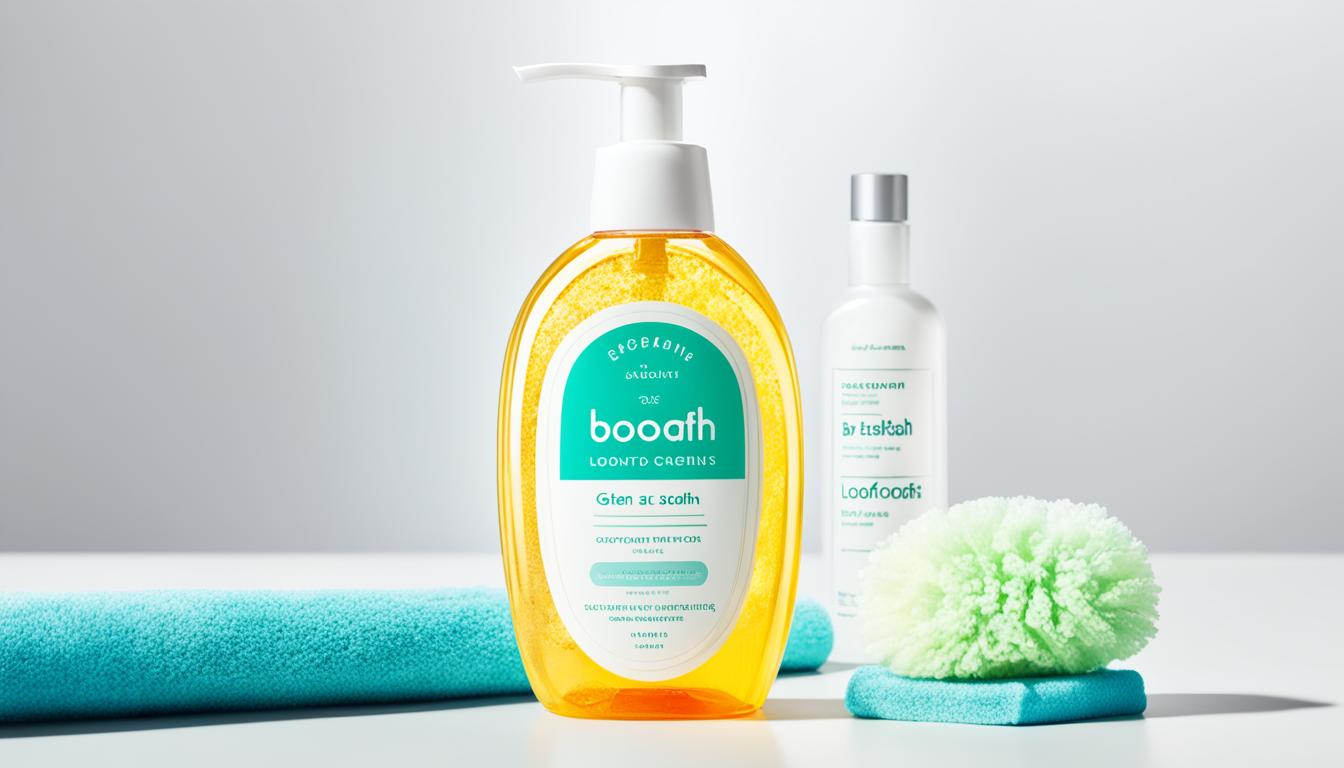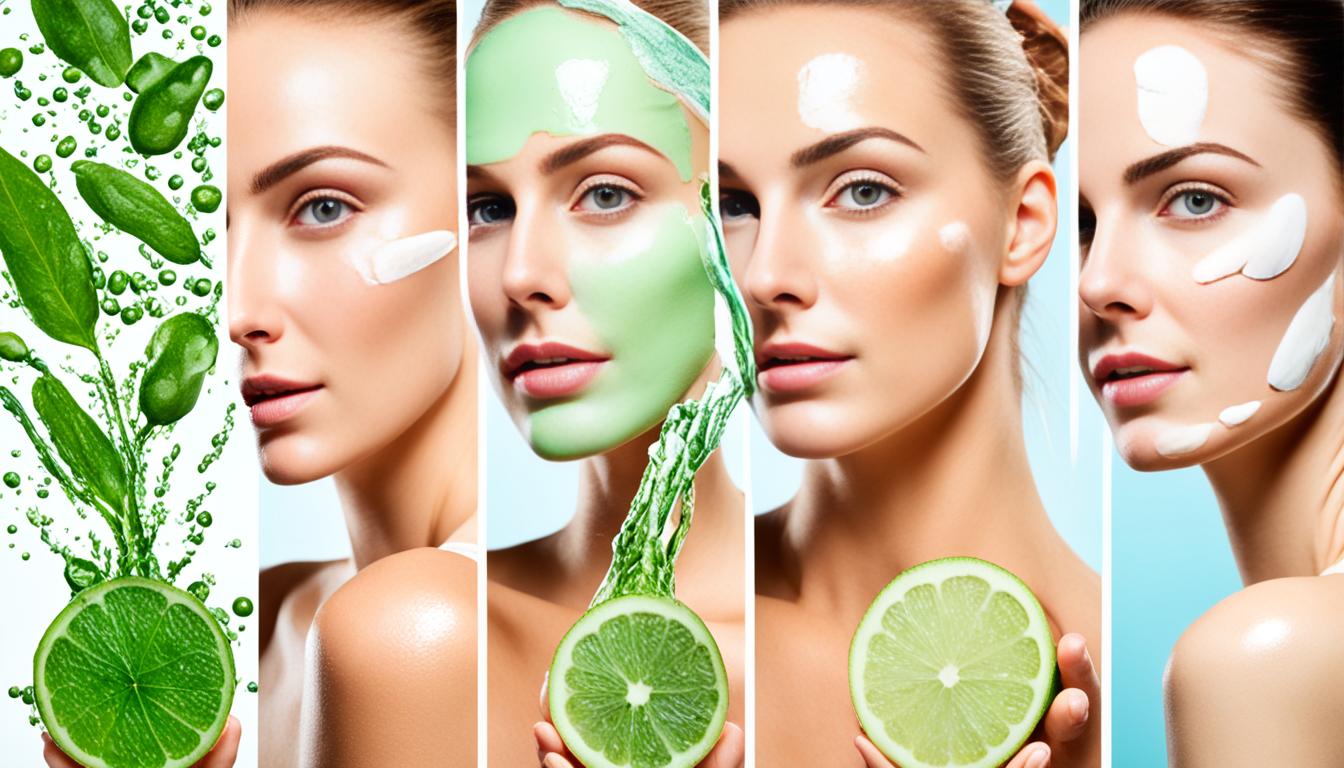When it comes to your bathing routine, choosing the right product for your body is essential. While hand soap and body wash may seem similar, they are actually designed for different purposes. But what if you run out of body wash and only have hand soap available? Can you use hand soap as body wash? Let’s explore this topic and find out!

Key Takeaways:
- Hand soap and body wash are similar products but have differences in composition and ingredients.
- Using hand soap as a substitute for body wash may not provide the same benefits and could lead to potential risks or issues.
- Each person’s skin type may react differently to hand soap and body wash, so it’s important to consider your skin’s needs.
- In emergencies or when body wash is unavailable, hand soap can be used as a temporary solution, but it should be used with caution.
- If you decide to use hand soap as body wash, follow some essential tips to ensure safety and minimize any potential adverse effects.
Understanding the Differences Between Hand Soap and Body Wash
Before we determine if hand soap can be used as body wash, let’s first understand the key differences between the two products.
Hand soap is specifically formulated for cleansing and sanitizing the hands. It is designed to remove dirt, bacteria, and viruses, while keeping the skin clean and moisturized. Hand soap is typically available in liquid or bar form and comes in various scents and formulations to cater to different preferences.
Body wash is a product designed for cleansing the entire body. Unlike hand soap, it is formulated to be gentle on the skin while effectively removing dirt, sweat, and bacteria. Body wash often contains moisturizing and nourishing ingredients to help hydrate and maintain the skin’s natural moisture balance. It is usually available in liquid form and comes in a wide range of fragrances and formulations to suit different skin types and preferences.
Now that we have an understanding of the basic differences between hand soap and body wash, let’s delve deeper into the composition and ingredients of hand soap in the next section.
Composition and Ingredients of Hand Soap
When it comes to hand soap, understanding its composition and ingredients can provide valuable insights into its effectiveness and suitability as a body wash substitute. Hand soap is specifically formulated for cleansing and maintaining hand hygiene. It typically consists of a combination of cleansing agents, moisturizers, fragrances, and preservatives. Let’s take a closer look at the key components:
Cleansing Agents
The primary function of hand soap is to remove dirt, oil, and bacteria from your hands. This is achieved through the inclusion of cleansing agents such as surfactants. Surfactants lower the surface tension between the soap and water, allowing for better spreadability and more effective cleaning. Common surfactants found in hand soap include sodium lauryl sulfate (SLS) and sodium laureth sulfate (SLES).
Moisturizers
While hand soap is designed to cleanse, it can also have a drying effect on the skin due to its ability to remove natural oils. To counteract this, many hand soaps contain moisturizing ingredients. Glycerin, for example, is a common moisturizer found in hand soaps. It helps to hydrate and replenish the skin, leaving it feeling softer and smoother.
Fragrances
Hand soaps often contain fragrances to enhance the sensory experience of handwashing. These fragrances can range from fresh and floral scents to invigorating citrus or herbal notes. However, it’s important to note that fragrances can sometimes cause skin irritation or allergies in individuals with sensitivities.
Preservatives
To prevent bacterial growth and extend the shelf life of hand soap, preservatives are added to the formulation. Common preservatives include parabens and phenoxyethanol. These ingredients help maintain the integrity of the product and ensure its safety and efficacy over time.
It’s important to note that the composition and ingredients of hand soap may vary between different brands and formulations. Some hand soaps may contain additional additives such as exfoliants or antibacterial agents. Therefore, it’s always a good idea to read the label and choose a hand soap that aligns with your individual needs and preferences.
“Understanding the composition and ingredients of hand soap can provide valuable insights into its effectiveness and suitability as a body wash substitute.”
| Component | Function | Examples |
|---|---|---|
| Cleansing Agents | Remove dirt, oil, and bacteria | Sodium lauryl sulfate (SLS), sodium laureth sulfate (SLES) |
| Moisturizers | Hydrate and replenish the skin | Glycerin, shea butter |
| Fragrances | Enhance the sensory experience | Lavender, citrus, herbal |
| Preservatives | Prevent bacterial growth, extend shelf life | Parabens, phenoxyethanol |
Understanding the composition and ingredients of hand soap can provide valuable insights into its effectiveness and suitability as a body wash substitute. By considering the cleansing agents, moisturizers, fragrances, and preservatives present in hand soap, you can make an informed decision about whether it meets your individual skincare needs. However, it’s worth noting that while hand soap may be suitable for occasional use as a body wash, it’s generally recommended to use products specifically formulated for that purpose to maintain optimal skin health.
What Makes Body Wash Suitable for the Entire Body?
Body wash is specifically formulated to cleanse and care for your entire body, making it a suitable option for your daily bathing routine. Unlike hand soap, which is primarily designed for hand hygiene, body wash offers a range of features and properties that cater to the needs of your entire body, including sensitive areas. Let’s explore what sets body wash apart and why it’s a preferred choice for many.
- Gentle and Nourishing: Body washes are formulated with gentle cleansing agents and nourishing ingredients that effectively remove dirt, sweat, and impurities from your skin without stripping away its natural moisture. This ensures that your skin remains soft, smooth, and hydrated, promoting overall skin health.
- Moisturizing Formulas: Many body wash products are enriched with moisturizing ingredients like oils, butters, and ceramides, which help replenish and retain moisture in the skin. This is especially beneficial for individuals with dry or sensitive skin, as it prevents dryness, itchiness, and discomfort.
- Rich Lather: Body washes often produce a rich and creamy lather, enhancing your bathing experience and making it easier to apply and distribute the product over your entire body. This lather helps to effectively cleanse and remove impurities, leaving your skin feeling refreshed and revitalized.
- Wide Range of Formulations: Body washes are available in a wide variety of formulations, catering to different skin types, preferences, and concerns. Whether you have oily, dry, or sensitive skin, there’s a body wash out there for you. Some options even target specific skin concerns, such as acne, aging, or uneven skin tone.
In addition to these features, body washes often come in an array of delightful scents, allowing you to enjoy a personalized and refreshing fragrance experience during your shower or bath.
Remember, choosing a body wash that suits your skin type and preferences is essential for achieving the best results. If you have any specific skin concerns or sensitivities, look for body washes that are labeled hypoallergenic, fragrance-free, or specially formulated for sensitive skin.
Now that we’ve explored what makes body wash suitable for the entire body, let’s take a closer look at the risks and issues that may arise from using hand soap as a substitute for body wash.

Potential Risks and Issues of Using Hand Soap on the Body
While using hand soap as a substitute for body wash may seem convenient, it’s important to be aware of the potential risks and issues that can arise. Hand soap and body wash are formulated differently to cater to specific needs, and using hand soap on your body may lead to unintended consequences.
The Risks of Using Hand Soap on the Body
One of the main risks of using hand soap on the body is the potential for skin irritation. Hand soap typically contains higher levels of detergents and fragrances, which can be harsh on the skin, especially for those with sensitive skin types. The ingredients in hand soap may strip away the skin’s natural oils, leading to dryness, redness, and discomfort.
It’s important to remember that the skin on your hands and body have different needs. What may work well for your hands might not be suitable for the rest of your body.
In addition to skin irritation, using hand soap on the body may disrupt the natural pH balance of your skin. Hand soap is typically more alkaline, while the skin’s natural pH is slightly acidic. This imbalance can disturb the skin’s barrier function, making it more susceptible to bacteria, infections, and other skin issues.
Issues with Using Hand Soap as Body Wash
When using hand soap as body wash, you may also encounter some practical issues. Hand soap is generally designed for frequent handwashing and may not lather or rinse as effectively on larger areas of the body. This can make it difficult to achieve a thorough cleanse and may leave residue on the skin.
Furthermore, the fragrance in hand soap may not be as pleasant or long-lasting when used on the entire body. Body washes often contain specialized fragrances that are designed to linger and provide a refreshing scent throughout the day.
The Importance of Choosing the Right Product for Your Body
Your skin, being the largest organ of your body, deserves specialized care. While using hand soap in a pinch may be acceptable for occasional use, it’s best to choose a body wash formulated specifically for your skin’s needs. Look for products that are gentle, hydrating, and free from harsh chemicals. It’s also advisable to consider products labeled as suitable for your skin type, whether that be dry, oily, or sensitive.
| Risks of Using Hand Soap on the Body | Issues with Using Hand Soap as Body Wash |
|---|---|
| — Skin irritation and dryness | — Difficulty achieving a thorough cleanse |
| — Disruption of the skin’s natural pH balance | — Reduced fragrance effectiveness |
| — Increased susceptibility to bacteria and infections | |
| — |
Ultimately, taking care of your skin should be a priority. While hand soap may be sufficient for handwashing, investing in a quality body wash can provide the nourishment and cleansing your body deserves.
Skin Types and Reactions to Hand Soap vs. Body Wash
Different skin types may react differently to hand soap and body wash. Understanding how your skin reacts to these products is crucial in determining the best option for your skincare routine.
Here are the common skin types and their potential reactions:
1. Normal Skin
Normal skin is well-balanced and neither too oily nor too dry. It tends to tolerate both hand soaps and body washes without any major issues. However, some individuals with normal skin might still prefer the milder formulation of body wash.
2. Dry Skin
If you have dry skin, hand soap may further strip away your skin’s natural oils, exacerbating dryness and causing irritation. Body washes, particularly those with moisturizing properties or containing ingredients like glycerin or shea butter, can help hydrate and nourish dry skin.
3. Oily or Acne-Prone Skin
Oily or acne-prone skin types are more prone to breakouts and excess oil production. Hand soaps, especially those containing harsh detergents or fragrances, may clog pores and worsen acne. Opting for a body wash specifically formulated for oily or acne-prone skin can help control oiliness and minimize breakouts.
4. Sensitive Skin
Sensitive skin requires extra care and caution when choosing skincare products. Compared to hand soaps, body washes are generally formulated with milder ingredients and are less likely to cause irritation or allergic reactions. Look for fragrance-free or hypoallergenic body washes suitable for sensitive skin.
It’s important to listen to your skin and pay attention to any reactions or discomfort when using different products. If you notice any redness, itching, or dryness, it may be a sign that the product is not suitable for your skin type.
Remember: Everyone’s skin is unique, and individual reactions can vary. If you’re unsure about using hand soap or body wash on your skin, consult with a dermatologist for personalized advice.

Can Hand Soap Be Used as Body Wash in Emergencies?
Sometimes, emergencies can catch us off guard, leaving us without our usual supplies. If you find yourself in a situation where you run out of body wash, using hand soap as a temporary solution may seem like a viable option. While it’s not ideal, it can help you stay fresh and clean until you’re able to restock on your preferred body wash.
When considering using hand soap as body wash in emergencies, there are a few factors to keep in mind. First, check the ingredients of the hand soap. Some hand soaps may contain harsh chemicals or fragrances that could irritate your skin when used on the body. Look for hand soaps that are gentle and free from allergens.
Next, consider the type of skin you have. If you have dry or sensitive skin, using hand soap as body wash may cause further dryness or discomfort. In these cases, it’s best to avoid using hand soap as body wash and opt for alternative options if available.
Pro Tip: In emergencies, it’s always a good idea to have versatile products, such as mild body washes or gentle cleansing bars, as part of your emergency supply kit. These can be used on both the body and face, providing a more suitable and gentler alternative to using hand soap.
If you decide to use hand soap as body wash in emergencies, there are a few steps you can take to minimize any potential risks:
- Choose a hand soap that is mild and suitable for sensitive skin.
- Rinse thoroughly to ensure all soap residue is removed from the body.
- Moisturize your skin after washing to help replenish any moisture lost during cleansing.
Remember, using hand soap as body wash should only be a temporary solution during emergencies. It’s important to restock on your preferred body wash as soon as possible to maintain a healthy skincare routine.
Skin Evaluation: Your Cure for Emergency Situations
When it comes to emergencies, taking care of your skin in the best way possible is crucial. Whether you find yourself without body wash or facing other skin-related issues, understanding your skin type can help you make informed decisions. By evaluating your skin type and considering any existing skin conditions, you can choose the most suitable products, even in emergency situations.
Let’s take a closer look at different skin types and how they may react to hand soap as body wash:
| Skin Type | Reactions to Hand Soap as Body Wash |
|---|---|
| Dry Skin | Using hand soap as body wash may exacerbate dryness and cause tightness or irritation. |
| Oily Skin | Hand soap can effectively cleanse the skin, but it may not address the specific needs of oily skin, such as excess sebum control. |
| Combination Skin | While hand soap may work fine on areas with oily skin, it may strip moisture from drier areas, leading to an imbalance. |
| Sensitive Skin | Using hand soap as body wash can potentially cause irritation and redness, especially for those with sensitive skin. |
Understanding how your skin type may react to different products will help guide your decisions when it comes to using hand soap as body wash in emergencies. Ultimately, listening to your skin’s needs and taking the necessary precautions will ensure you maintain healthy skin even during unforeseen circumstances.
Tips for Using Hand Soap as Body Wash Safely
If you’ve decided to use hand soap as body wash, it’s important to follow these tips to ensure your safety and minimize any potential risks.
1. Check the pH Level
Hand soaps and body washes have different pH levels, which can affect the health of your skin. Look for a hand soap with a pH level close to that of body wash, ideally around 5.5, to maintain the natural balance of your skin.
2. Patch Test
Before using hand soap all over your body, perform a patch test on a small area of your skin to check for any adverse reactions. Apply a small amount of hand soap to the inside of your wrist or elbow and wait 24 hours to ensure you don’t experience any irritation or allergies.
3. Moisturize Afterward
Using hand soap as body wash can be more drying to your skin. Remember to moisturize your skin thoroughly after each use to keep it hydrated. Look for moisturizers that contain ingredients like shea butter or hyaluronic acid to lock in moisture.
4. Avoid Sensitive Areas
Be cautious when using hand soap on sensitive areas of your body, such as your face or intimate areas. Hand soap may contain harsher ingredients that can cause irritation. It’s recommended to use a gentle cleanser specifically formulated for these areas instead.
5. Use in Moderation
While hand soap can be a temporary solution, using it as a long-term replacement for body wash may not be ideal. It’s best to use hand soap as body wash sparingly and only in situations where body wash is not available.
Remember, using hand soap as body wash is not the same as using the intended product. It’s essential to prioritize your skin’s health and use suitable products whenever possible.
| Tips for Using Hand Soap as Body Wash Safely: |
|---|
| 1. Check the pH Level |
| 2. Patch Test |
| 3. Moisturize Afterward |
| 4. Avoid Sensitive Areas |
| 5. Use in Moderation |
By following these tips, you can use hand soap as body wash safely when necessary, while still prioritizing the health and well-being of your skin.
Alternatives to Using Hand Soap as Body Wash
If you’re not comfortable using hand soap as a substitute for body wash, there are several alternative options you can explore to maintain your bathing routine. These alternatives provide a variety of beneficial features and cater to different skin types and preferences. Here are some options to consider:
Natural and Organic Body Wash
If you prioritize natural ingredients and want to avoid harsh chemicals, opt for natural and organic body wash. These products are formulated with plant-based extracts and essential oils that cleanse and nourish the skin without stripping away its natural moisture. Look for brands that are certified organic and free from parabens, sulfates, and artificial fragrances.
Moisturizing Body Wash
For individuals with dry or sensitive skin, moisturizing body washes can provide the hydration and relief needed. These products often contain ingredients like shea butter, aloe vera, and glycerin, which moisturize and soothe the skin, leaving it soft and supple. Look for body washes specifically labeled for dry or sensitive skin.
Gentle Cleansers
If you have sensitive or easily irritated skin, consider using gentle cleansers that are specifically designed for sensitive skin types. These cleansers are formulated with mild ingredients that cleanse without causing irritation or redness. Look for products that are fragrance-free and hypoallergenic.
Exfoliating Body Scrubs
To remove dead skin cells and promote a smoother, healthier complexion, exfoliating body scrubs are a great alternative. These scrubs typically contain mild abrasives like sugar, salt, or coffee grounds, which gently slough away dead skin, revealing a more radiant appearance. However, be sure to use these scrubs only a few times a week to avoid over-exfoliation.
Shower Gels
Shower gels are a versatile option that can suit a wide range of preferences and skin types. They come in various scents, consistencies, and formulations, allowing you to find the perfect match for your needs. Whether you prefer refreshing citrus fragrances or soothing lavender, there’s a shower gel out there for you.
By exploring these alternatives, you can find a suitable option that meets your needs and preferences, without resorting to using hand soap as body wash. Remember to always read product labels, consider your skin type, and choose formulas tailored to your specific requirements.
| Alternative | Features |
|---|---|
| Natural and Organic Body Wash | Plant-based ingredients, no harsh chemicals |
| Moisturizing Body Wash | Hydrating formulation, suitable for dry or sensitive skin |
| Gentle Cleansers | Mild formula, fragrance-free, hypoallergenic |
| Exfoliating Body Scrubs | Removes dead skin cells, promotes smoother skin |
| Shower Gels | Versatile options, various scents and consistencies |
Conclusion
After examining the possibility of using hand soap as body wash, discussing the differences between the two, and addressing potential risks, it is clear that the decision is ultimately yours to make based on your preferences and the needs of your skin.
While hand soap and body wash may seem similar, they have distinct compositions and ingredients. Body wash is specifically formulated to be suitable for use on the entire body, including sensitive areas. On the other hand, hand soap is primarily designed for cleansing the hands and may contain harsher ingredients.
Using hand soap as a temporary substitute for body wash in emergency situations may be acceptable, but it’s important to note that hand soap is not intended for prolonged use on the body. Different skin types may react differently to hand soap, potentially leading to dryness, irritation, or other adverse reactions.
To use hand soap as body wash safely, there are a few tips to keep in mind. Make sure to choose a mild, moisturizing hand soap and limit use to short-term situations only. Additionally, it’s always a good idea to patch test the product on a small area of your skin before applying it to your entire body.
If you’re not comfortable using hand soap as body wash, there are alternative options available. Look for body washes that are specifically formulated for your skin type and concerns. Experimenting with different products can help you find the one that suits your needs best.
In conclusion, whether you choose to use hand soap as body wash or opt for a dedicated body wash product, it’s crucial to prioritize the health and well-being of your skin. Your skin deserves proper care and attention to maintain its natural balance and prevent any potential issues that may arise from using the wrong product.
FAQ
Can I use hand soap as body wash?
No, it is not recommended to use hand soap as body wash. Hand soap is specifically formulated for cleaning hands and may have ingredients that can be too harsh or drying for the rest of your body.
What are the differences between hand soap and body wash?
Hand soap and body wash differ in their formulation, purpose, and intended use. Hand soap is designed to effectively cleanse hands, while body wash is created to clean the entire body, including sensitive areas.
What is the composition of hand soap?
Hand soap is typically composed of water, surfactants, moisturizing ingredients, cleansing agents, and fragrance. The exact ingredients may vary depending on the brand and specific product.
Why is body wash suitable for the entire body?
Body wash is formulated to be gentle on the skin and suitable for use on the entire body. It contains moisturizing agents and mild cleansing ingredients that help maintain the skin’s natural moisture balance.
Are there any risks or issues with using hand soap on the body?
Using hand soap as a substitute for body wash can potentially lead to dryness, irritation, and discomfort. Hand soap may be too harsh for the delicate skin on the body, especially on sensitive areas.
How do different skin types react to hand soap and body wash?
Different skin types may have varying reactions to hand soap and body wash. Those with dry or sensitive skin might experience increased dryness or irritation when using hand soap instead of body wash.
Can hand soap be used as body wash in emergencies?
In emergency situations or when body wash is unavailable, using hand soap as a temporary solution may be acceptable. However, it should not become a regular practice as it may cause undesirable effects on the skin.
What are some tips for using hand soap as body wash safely?
If you decide to use hand soap as body wash, ensure you rinse thoroughly, moisturize your skin after bathing, and avoid using hand soaps with harsh ingredients or fragrances. It’s best to consult a dermatologist for personalized advice.
Are there alternatives to using hand soap as body wash?
Yes, there are alternative options to consider if you’re uncomfortable using hand soap as body wash. Some alternatives include gentle shower gels, moisturizing body washes, or natural soap bars that are specifically formulated for body use.
What is the conclusion regarding using hand soap as body wash?
In conclusion, while using hand soap as body wash may be a temporary solution in emergencies, it is not recommended for regular use. Body wash is formulated to be gentle, moisturizing, and suitable for use on the entire body.


